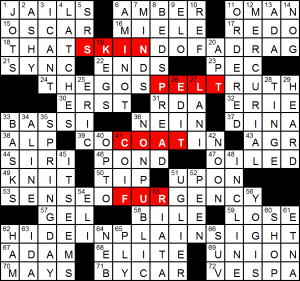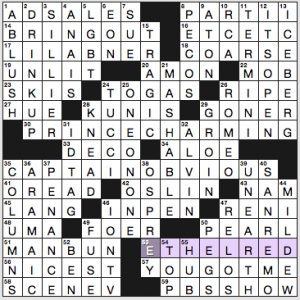 (3.17 avg; 60 ratings) rate it
(3.17 avg; 60 ratings) rate it
Bruce Haight’s New York Times crossword—Amy’s write-up
I did things with 34 different crosswords for work today, so I’m pretty tired of crosswords at the moment. This may be an oddly structured post.
I like ETHELRED because I worked with a guy named Ethelbert and these Old English names rock. The parenthetical “(ooh, that hurts!)” in the clue is just weird, though.
33a. [Style influenced by Cubism], Art DECO. Did not know this, makes sense, am glad to have learned it. Other trivia I liked: 35d. [38 things in the Lincoln Memorial], COLUMNS.
Do not like: Two things ending with Roman numerals, PART II and SCENE V. Crosswordese OREAD. Kind of contrived PBS SHOW (you gonna have NBC SHOW, AMC SHOW, USA SHOW, and all the rest? I don’t think so). ABLUSH. IN PEN. Guido RENI crossing SAN REMO.
Quasi-mini-theme: 30a. [He might say “A day without you is like a day without sunshine”], PRINCE CHARMING. I’m sorry, which PRINCE CHARMING is this? Is it the dude from Cinderella? Because the clue better be a movie quote, then. 35a. [He might say “A day without sunshine is like, you know, night”], CAPTAIN OBVIOUS. Deb Amlen mentioned that this quip should be attributed to Steve Martin rather than the nonexistent/metaphorical CAPTAIN OBVIOUS. Puzzle would work much better without these two otherwise-good entries being clued in forced tandem.
I do not at all like the LGBT clue, 5d. [Prideful grp.?]. The question mark doesn’t get around the fact that prideful is a bad thing to be, not the equivalent of proud. Don’t be cutesy by insulting my friends.
3.25 stars from me.
Jeffrey Wechsler’s LA Times crossword – Gareth’s write-up

LA Times
180727
On Friday, we usually see a theme with a code of some sort that is needed to be cracked before the theme answers make sense. Before that happens, the theme answers are a major impediment to solving. Not today, which is more like a typical midweek theme. Straight-up answers, tied together by a final punchline. HIDEINPLAINSIGHT is a great finale, working on two levels – synonyms for hide are hiding: SKIN, PELT, COAT, FUR.
Despite the easier theme, I found this puzzle more difficult than most Friday LA Times puzzles. I took about 30% longer than today’s NY Times! I can’t put my finger on it, but I struggled to find traction anywhere. There weren’t a lot of gimmes, and the ones that were there, I moved around. There were a few unknowns for me, but they were widely spaced – appliace brand MIELE; DINA Meyer; LANI Guinier (theorist?); the long answer SPRINGDAY, though that area was the only part of the puzzle where I didn’t struggle!
3.75 Stars
Gareth

Did not like mashable/oslin cross. Natick no?
Agreed that the parenthetical in the Ethelred clue was a headscratcher. It’s like Will was trying to emulate the AVCX cluing style (which isn’t really my cup of tea, tbh). Besides, the epithet “Unready” isn’t even insulting to Ethelred himself… it’s aimed at his advisors! Unready meant “badly advised” in the 10th century.
I don’t agree, however, that “Proud grp.” is an improved clue for LGBT. I think it would be too hard to see the connection to Pride.
Agreed on “Proud” vs. “Prideful.” Even though “proud” is closely related word to Pride linguistically, you don’t see or hear “proud” much at Pride events or the queer community in general. I also think it’s a stretch to say that a word with negative connotations in a wordplay clue is insulting to the answer.
Nowhere did I suggest [Proud grp.?] as a clue. I was merely pointing out that the two words are distinct in meaning. You can check the various crossword databases to see LGBT clues that work better.
Way too many clues with names I didn’t know or care to know. The Tucci/Kunis crossing was a natick for me. Never heard of Foer… in general, there was too much obscure esoterica for my taste.
I’ve heard of Foer and Tucci but not natick. What does that mean?
In one crossword a few years back, the answer NATICK, which was clued as a town on the 8th mile of the Boston Marathon, crossed N.C. WYETH on the N. Rex then coined the “Natick” principle, which is that if you have a word that can’t reasonably be heard of by more than 1/4 of the solvers, then all the other crosses must be inferrable or universally known. When there’s a crossing of two proper nouns, you often get Naticked because there’s no real way of guessing what letter goes in the intersection.
Of course, NC Wyeth is one of the most important illustrators of the 20th century. Father also to one of the most well-known American painters of the 20th century.
I think it’s mostly that it intersected at the N, which, if you don’t specifically know the name, could have been any of 26 letters. Similarly, ?ATICK requires you to specifically know the name, as every consonant, and even some vowels, could conceivably be a the name of the town.
I understand completely. Natick—the town—I agree about. But NCWYETH should be at the very least moderately common knowledge in my opinion.
Thanks. I’ve certainly been confounded by two proper names crossing but had no idea this circumstance had acquired a name.
One does not put seven UNLIT candles on the hanukkiah for the first night. No. Just, no.
it’s called a menorah
even if you’re really lazy?
No even if you are ridiculously lazy, as you ignite more candles each night and have to fill the menorah as the days pass
The clue might (*might*) have worked if it said bulbs instead of candles, but would it be understood that there are electric menorahs?
Since there was a question mark on the “prideful” clue, I was looking for a group of lions. Don’t like the cluing style either and too much unheard-of esoterica (names).
She “is on the run”
What is she doing?
SKIS or SKIING?
“Is at the plate” bats
“Is behind the wheel” drives
https://www.merriam-webster.com/dictionary/ski%20run
Well it depends on whether you are describing a situation or an action.
If he “is at the plate”, would you say “he bats” as in “he bats at the plate” instead of the mound? Same with the others. but the clue is “is ON the run” which I interpret to mean moving and then it would be “is skiing.” If she were just standing there, you couldn’t use “skis” either because that implies motion. The only way it makes sense is if you ask “what does she do on the run?” but that was not the clue.
I provided a link to the definition of ski run. Note also that the clue has a question mark, implying that there might be a little misdirection, in this case to not parse ‘on the run’ in the idiomatic sense.
[she] is at the plate → [she] bats
[she] is behind the wheel → [she] drives
The prepositional phrases of those examples can’t really be construed as anything else, so if they were clued for a crossword they wouldn’t take a question mark.
would you say “she is behind the wheel and drives to the store”?
i am not sure about the question mark as i didn’t pick it up when doing the puzzle. in this case, does it really make that much of a difference? I don’t claim to know, only that misdirection usually, in my way of thinking, refers to something that is not usually thought of that way. maybe if we were in a ski lodge and had that clue, we would be misdirected to someone on the lam.
Perhaps you should put less stock in apparently rigid analyses?
It seems as if you’re willfully rejecting alternatives rather than granting them reasonable consideration.
Your own example undermines the argument:
My point, explicitly, was that the clue as presented suggests the common idiomatic sense of ‘on the run’ and the question mark indicates that the solver should consider it some other way, in some other context. To wit, as a ski run. It seems to me you have it exactly backwards from your own assertion.
pannonica is (as usual) correct. But maybe it would help to go back to your original post:
She “is on the run”
What is she doing?
When you’re solving the puzzle, the clue isn’t asking for the answer to your question, “What is she doing?” It’s asking for what will appropriately replace the phrase that comprises the clue (and that you have in quotes in your original post).
Which works better – She SKIS or She SKIING?
Like a laser through butter!
So simple I completely missed it. My contextual assumptions took me right past.
Shout out to Mel Taub and his great puzzles
No mention of RELOS, a slang term I have never heard in my life, and can’t even really discern the etymology of?
…and now I realize I misread the clue as “movies” and not “moves”.
I am a very average puzzle solver and I knew both Tucci Kunis and Foer. I suggest that determining a Nadick crossing is highly subjective, thouh I know I’ve had plenty of them.